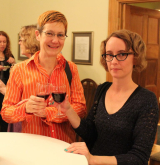Students completing the Graduate Diploma in Translation (GDIT) must sit a comprehensive examination at the conclusion of the GDIT Program. The examination consists of an oral defense of a best-work portfolio. This portfolio represents a record of progress made by the candidate throughout his/her studies. Each candidate prepares a written introduction and comments on selected examples of coursework with a view to demonstrating his/her progress toward greater translation competence.
Professionals and researchers from around the world will be coming together in April to reflect on the ideological nature of translation and the ways in which engaged translators have promoted a wide variety of conceptual agendas throughout history. Researchers and practicing translators will reflect on translations as artefacts of sociopolitical change.
Dr. James Archibald has been appointed to the ISO/TC 37 mirror committee on language and terminology in The Standards Council of Canada. The Standards Council of Canada is the Canadian arm of the International Organization for Standardization (ISO) and the ISO/TC 37 has published internationally recognized standards on a variety of translation-related issues and technologies.
Read an interview with McGill School of Continuing Studies' former director of Translation Studies, James Archibald, in Métro. The flexibility of the program, along with the internship component and use of innovative software, was highlighted.
The article is available in French only. Click here to read the article.
Students completing the Graduate Diploma in Translation (GDIT) must sit a comprehensive examination at the conclusion of the GDIT Program. The examination consists of an oral defense of a best-work portfolio. This portfolio represents a record of progress made by the candidate throughout his/her studies. Each candidate prepares a written introduction and comments on selected examples of coursework with a view to demonstrating his/her progress toward greater translation competence.
 Hélène Roulston and Cheryl Smeall at the 2017 McGill Associates Prize in Translation reception.Translation is elemental to the economic and social fabric of Canadian society.
Hélène Roulston and Cheryl Smeall at the 2017 McGill Associates Prize in Translation reception.Translation is elemental to the economic and social fabric of Canadian society.
par Carlos Del Burgo, terminologue agréé, traducteur agréé.
J. Archibald, senior faculty lecturer in translation studies at McGill University, has been appointed to the Advisory Board for a collection on language, translation and language didactics, Lingua Traduzione Didattica, published by FrancoAngeli, an Italian academic publishing house.
McGill University’s new Graduate Certificate in Legal Translation is intended to support current or aspiring professionals and paraprofessionals whose work does or may consist in the bi-or multi-lingual drafting and translation of legal documents used in public, private and parapublic organizations.
What range of skills contribute to making a successful translator? According to Jean Massicotte, his understanding of linguistics, science, writing techniques and project management paved the way to success. Massicotte is the 2017 recipient of the McGill Associates Prize in Translation (English-French). He received this distinction at the spring graduation ceremony when he was awarded a Certificate in Translation in the English to French option.
Mastering documentation is one of the pathways to translation excellence. Mastering it in more than one language is an added value. Such is the case for Cheryl Smeall, who is the 2017 recipient of the McGill Associates Prize in Translation (French-English). Dr. Smeall received this distinction at the spring graduation ceremony when she was awarded a Certificate in Translation in the French to English option.
What better way to become an experienced translator than to work one’s way up from the bottom. Hélène Roulston is living proof of the adage that one becomes a good translator by producing good translations and having the knowledge base to produce quality work. That sums up Hélène Roulston’s recipe for success. She is the 2017 recipient of the McGill Associates Prize in Translation (English-French).
Students completing the Graduate Diploma in Translation (GDIT) must sit a comprehensive examination at the conclusion of the GDIT Program. The examination consists of an oral defense of a best-work portfolio. This portfolio represents a record of progress made by the candidate throughout his/her studies. Each candidate prepares a written introduction and comments on selected examples of coursework with a view to demonstrating his/her progress toward greater translation competence.
WHEN: April 27 – 28, 2017
WHERE: McGill University – 688 Shebrooke Street West, room 1041 (10th floor) (metro McGill)
FOR COMPLETE PROGRAM: www.mcgill.ca/scs-colloquium
Students completing the Graduate Diploma in Translation (GDIT) must sit a comprehensive examination at the conclusion of the GDIT Program. The examination consists of an oral defense of a best-work portfolio. This portfolio represents a record of progress made by the candidate throughout his/her studies. Each candidate prepares a written introduction and comments on selected examples of coursework with a view to demonstrating his/her progress toward greater translation competence.
